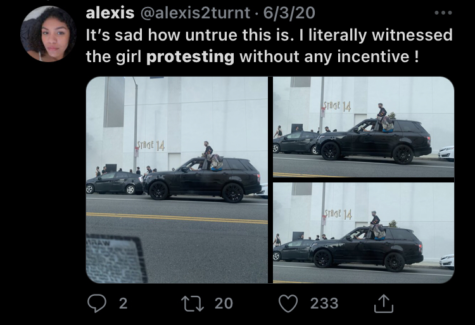Are We Masking Our Activism?
May 7, 2021
As technology and social media are becoming more prominent, the idea of self-image and publicity has affected everything from businesses to people who are concerned about image and how they appear to a worldwide audience. As a result, there has been an uptick in supposedly “supporting” social causes. This is known as Performative Activism.
Performative activism can be seen in different shapes and sizes, but at the core, it is the idea of showing support of social issues through a social platform only to increase one’s self-image or digital reputation, and the media has encouraged them to do so.
First and foremost, this happens on an individual level. Last year, during summer, there were protests for police brutality, racism, and the murder of George Floyd. There was a social media event called “Blackout Tuesday.” This is where you post a black square in place of your profile picture in order to show allyship. While most people participated, everyone readily took them down to have a more “normal” feed. If people are willing to participate in one, small way for one day, how much do they really care about the issues or the people affected by them?
The answer is, they don’t.
People feign allyship by hopping on the bandwagon out of paranoia that people might find out that they either don’t care, don’t agree, or both. So, they post on social platforms securing that their online reputation aligns with everyone else’s.
This effect has even carried over to celebrities.
From the words of an article in the The New Yorker, John Coley; “The current cultural moment is one whose urgency feels particularly ill-suited to the sort of vapid pageantry that typically constitutes the ‘socially conscious’ arm of a celebrity’s public-relations repertoire.”
Celebrities often pretend to care about social issues in order to avoid the dangerous claws of cancel culture. They post pictures of going to Black Lives Matter (BLM) protests in an effort to save face.
Need proof? Celebrity influencer Madison Beer, over the summer, staged a photo opportunity of her protesting at a BLM movement. Many criticized her for hiring a photographer to promote her feigned activism. What other reason would you hire a professional photographer during a protest unless to gain clout for seeming “woke.”

It is possible for celebrities (or anyone) to simply support a cause without publicizing it. For example, singer Arianna Grande simply attended a BLM protest without posting or saying that she did it.
These unhealthy habits can be carried over from celebrities to big business.
Big and small businesses are guilty of this as well; for example, during pride month, we see many businesses changing their profile pictures and posts to LGBTQIA+ symbols and colors; this is called rainbow washing. But the day after the month ended, they went right back to normal, not even touching anything related to the subject, because, generally, they don’t care about the LGBTQIA+ community, just the money that comes in from pretending to support it.
A few months back, actor Gina Carona posted some risky social media comments, comparing republicans to people of the Jewish religion, saying that they were being oppressed. As a result, she lost her job as an actor for the show Mandolorian. Disney fired her, that way they weren’t linked to such beliefs.
Disney saw the way she was slandered for such beliefs and wanted no part in what she had to say. So they distanced themselves from her and her beliefs by firing her. That seems normal to hold people responsible for offensive statements, but what they did next is the kicker.
Shortly after, Disney filmed the live-action version of Mulan in China. In case you weren’t informed, there are concentration camps for Muslims in China; people of the Muslim faith are being starved and forced to eat pork as meals. This is against their religion, and have also been given terrible living conditions all because of their religion. For more information, please visit these links: PBS / USA Today.
So, what does Disney do to help these people being tortured in China? Nothing; they got their movie footage and that’s all they needed. They will fire celebrities with edgy Tweets but sit on their hands when it comes to tortured Muslims in concentration camps, because they know what their audience panders to. Many more people were enraged by Carono’s public statements, which could be linked to Disney, than by Disney’s lack of awareness of human suffering. This is a pivotal example of a company using performative activism.
Disney is living proof of performative activism in businesses, but they feature it through their streaming services, as well.
Both Disney + and Netflix added categories called “Black Stories,” which is fine, but you have to speculate on WHY. They added these categories in early June, just when racial tensions were building up. It begs the question: why would they add it now? It’s simple; while it was trending, they wanted to seem “woke” by adding it.
To make matters worse, once the year went by, Netflix removed the category from the home page and now you have to look it up to get it, showing that they only cared while it was relevant.
This is a sickness, and it will only grow as technology advances, so this problem will be snowballing as time goes on if we don’t try and stop it or find a more authentic way to voice our social concerns.
In a world where we are forced to wear masks, we have chosen to deliberately wear masks to preserve our reputation, all for the sake of our benefit even if it means someone’s well-being might be at risk. One would argue that this general fakeness is America’s original pandemic.


Oliver • Mar 31, 2022 at 1:11 pm
Spot on!